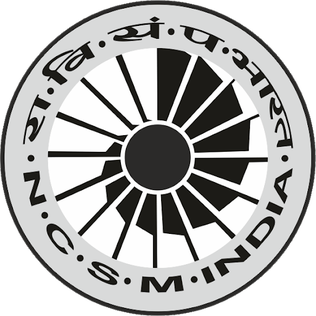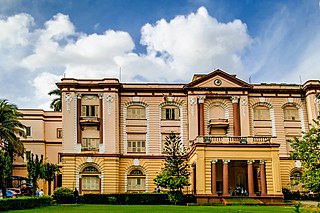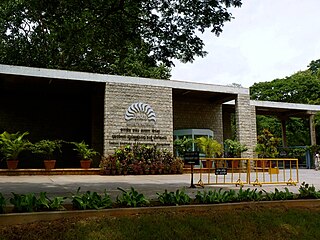Related Research Articles
The Birla family is an Indian business family connected with the industrial and social history of India.

Ashoke Sen FRS is an Indian theoretical physicist and distinguished professor at the International Centre for Theoretical Sciences (ICTS), Bangalore. A former distinguished professor at the Harish-Chandra Research Institute, Allahabad, He is also an honorary fellow in National Institute of Science Education and Research (NISER) India he is also a Morningstar Visiting professor at MIT and a distinguished professor at the Korea Institute for Advanced Study. His main area of work is string theory. He was among the first recipients of the Breakthrough Prize in Fundamental Physics "for opening the path to the realization that all string theories are different limits of the same underlying theory".

Tata Institute of Fundamental Research (TIFR) is an Indian Research Institute under the Department of Atomic Energy of the Government of India. It is a public deemed university located at Navy Nagar, Colaba in Mumbai. It also has a campus in Bangalore, International Centre for Theoretical Sciences (ICTS), and an affiliated campus in Serilingampally near Hyderabad. TIFR conducts research primarily in the natural sciences, the biological sciences and theoretical computer science.

The Indian Astronomical Observatory (IAO) is a high-altitude astronomy station located in Hanle, India and operated by the Indian Institute of Astrophysics. Situated in the Western Himalayas at an elevation of 4,500 meters (14,764 ft), the IAO is one of the world's highest located sites for optical, infrared and gamma-ray telescopes. It is currently the tenth-highest optical telescope in the world.

Indian Statistical Institute (ISI) is a public research university headquartered in Kolkata, West Bengal, India. It was declared an Institute of National Importance by the Government of India under the Indian Statistical Institute Act, 1959. Established in 1931, it functions under the Ministry of Statistics and Programme Implementation of the Government of India.

Thanu Padmanabhan was an Indian theoretical physicist and cosmologist whose research spanned a wide variety of topics in gravitation, structure formation in the universe and quantum gravity. He published nearly 300 papers and reviews in international journals and ten books in these areas. He made several contributions related to the analysis and modelling of dark energy in the universe and the interpretation of gravity as an emergent phenomenon. He was a Distinguished Professor at the Inter-University Centre for Astronomy and Astrophysics (IUCAA) at Pune, India.

Birla Institute of Technology & Science, Pilani - Dubai is a private technical research university and a constituent college of Dubai International Academic City. It became the international campus of BITS Pilani in 2000, making it the second campus established. It is the first Indian university to have an overseas campus. The institute is backed by the Aditya Birla Group and is one of the first six institutes to be awarded the Institute of Eminence status in 2018.

National Council of Science Museums (NCSM) is an autonomous scientific organization functioning under the Ministry of Culture, Government of India for science communication through its network of science museums or science centres spread across India. It is the largest chain of science centers/museums under a single administrative umbrella in the world. There are 24 own science centers or museums and one R & D laboratory and training centre. The NCSM has been built to co-ordinate all informal science communication activities in the museum space in the country.

Birla Industrial & Technological Museum (BITM) is a science museum in Kolkata, West Bengal, India. It is a unit under National Council of Science Museums (NCSM), Ministry of Culture, Government of India. Initially under the governmental jurisdiction of the Council of Scientific & Industrial Research (CSIR), BITM is commonly recognized as the precursor of India's science museum concept.

B. M. Birla Planetarium is a large planetarium in Chennai, India. The fifth B. M. Birla planetarium in the country, it is located at Kotturpuram in the Periyar Science and Technology Centre campus which houses eight galleries, namely, Physical Science, Electronics and Communication, Energy, Life Science, Innovation, Transport, International Dolls and Children and Materials Science, with over 500 exhibits. Built in 1988 in the memory of the great industrialist and visionary of India B. M. Birla, it is considered the most modern planetarium in India, providing a virtual tour of the night sky and holding cosmic shows on a specially perforated hemispherical aluminium inner dome. Other Birla planetariums in India include the M. P. Birla Planetarium in Kolkata, the Birla Planetarium in Hyderabad, and the planetariums in Tiruchirapalli and Coimbatore.

B. M. Birla Science Museum is an Indian science museum located in Hyderabad, India. Constructed by civil engineer P. A. Singaravelu, it comprises a planetarium, museum, science centre, art gallery as well as a dinosaurium. The museum itself was the second phase of the science centre when it opened in 1990. The centre also houses India's first private Space Museum. The museum is a unique facility which is dedicated to history of the space program of India. The space museum was inaugurated in July 2019 and was curated by Pranav Sharma.

The Birla Planetarium in Kolkata, West Bengal, India, is a single-storeyed circular structure designed in the typical Indian style, whose architecture is loosely styled on the Buddhist Stupa at Sanchi. Situated at Chowringhee Road adjacent to the Victoria Memorial, St. Paul's Cathedral and the Maidan in Central Kolkata, it is the largest planetarium in Asia and the second largest planetarium in the world. There are two other Birla Planetariums in India: B.M. Birla Planetarium in Chennai and the Birla Planetarium in Hyderabad.

The Birla Institute of Technology and Science, Pilani is a private deemed university in Pilani, Rajasthan, India. It focuses primarily on higher education and research in engineering and sciences. BITS Pilani was one of the first six institutes in India to be declared Institution of Eminence. According to 2012 data, BITS Pilani has an acceptance rate of 1.47%, making it one of the most exclusive technical universities in the world.

Bengaluru is home to many educational and research institutions and has played a significant role in the contribution towards skill development. Bengaluru is considered to be one of the educational hubs in India.
Shashikumar Madhusudan Chitre FNA, FASc, FNASc, FRAS was an Indian mathematician and astrophysicist, known for his research in Astronomy and Astrophysics. The Government of India honored him, in 2012, with Padma Bhushan, the third highest civilian award, for his services to the sciences.
Ramanath Cowsik is an Indian astrophysicist and the James S. McDonnell Professor of Space Sciences at Washington University in St. Louis. He is considered by many as the father of astroparticle physics. A recipient of the Shanti Swarup Bhatnagar Prize, Cowsik was honored by the Government of India, in 2002, with the fourth highest Indian civilian award of Padma Shri
Badanaval Venkatasubba Sreekantan was an Indian high-energy astrophysicist and a former associate of Homi J. Bhabha at the Tata Institute of Fundamental Research (TIFR). He was also a Dr. S. Radhakrishnan Visiting Professor at the National Institute of Advanced Studies, Bangalore.
Brij Mohan Birla was one of the scions of Birla family and an industrialist and philanthropist. He was the youngest and 4th son of Baldeo Das Birla. He was chairman of Hindustan Motors, Ruby General Insurance, India Exchange Ltd, NBC Bearing and was on board of several other Birla companies. He founded Hindustan Motors in 1942 and NBC Bearings in 1946. CK Birla Group is successor to his branch of Birla family. He was president of Indian Chamber of Commerce in 1936 and the Federation of Indian Chambers of Commerce & Industry for year 1954.

Howrah Planetarium and Astronomical Research Centre commonly known as Howrah Planetarium is a planetarium in Howrah, West Bengal, that offers virtual tours of the night sky and cosmic shows in a specially perforated hemispherical dome. It is West Bengal's first 3D planetarium. This '4K' Planetarium is built on screening technology. A total of Rs 14 crores was spent on the construction of the planetarium or Taramandal. The planetarium conducts three shows every afternoon in Bengali, English and Hindi.
References
- 1 2 3 4 5 6 7 8 9 10 "About Us". M. P. Birla Institute of Fundamental Research. Retrieved 6 May 2012.
- 1 2 Charan, Sahana (27 September 2004). "A-Z of Astrobiology". The Hindu . Archived from the original on 31 October 2004. Retrieved 5 May 2012.
- 1 2 Mazumdar, Jhinuk (28 December 2009). "Nasa gadget for closer look at sun". The Telegraph. Calcutta, India. Archived from the original on 3 February 2013. Retrieved 5 May 2012.
- ↑ "Birla Planetarium". Lonely Planet. 2011. Retrieved 6 May 2012.